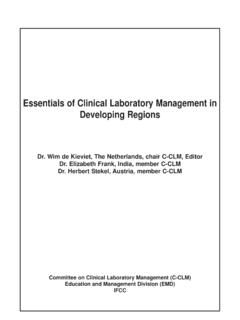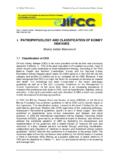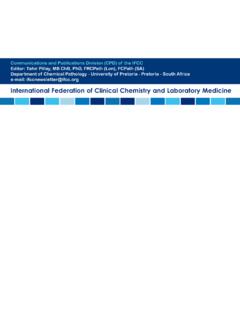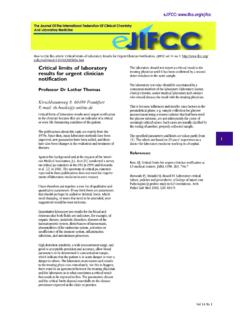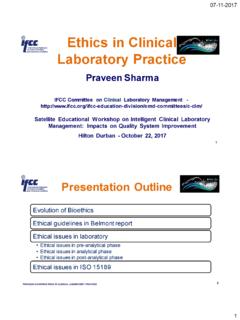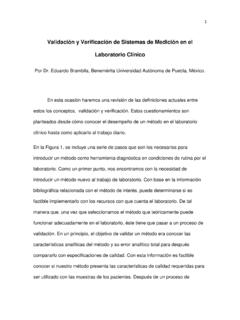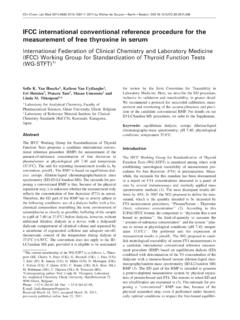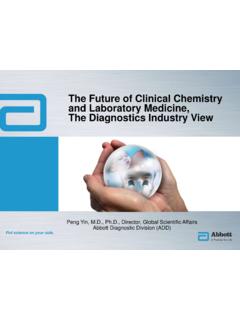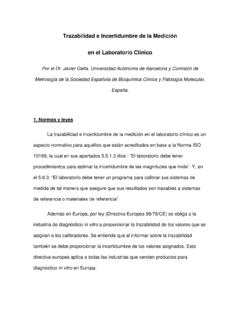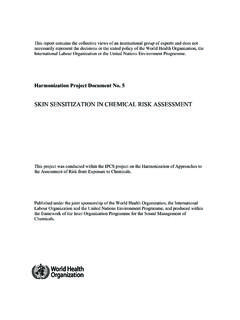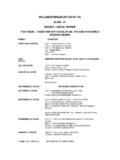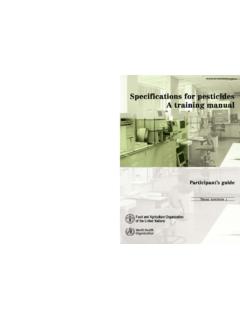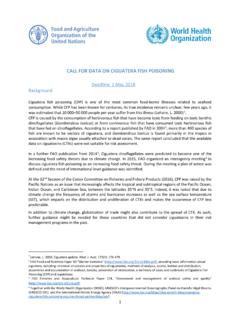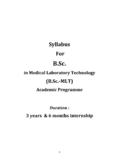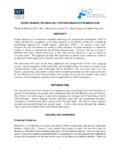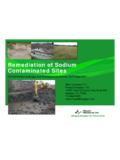Transcription of Editor: Edgard Delvin Ph.D Centre de Recherche
1 IFCC eNews May-June 2011 issue Editor: Edgard Delvin CHU Sainte-Justine Centre de Recherche 3175 C te-Ste-Catherine Montr al, Qu bec H3T 1C5, Canada e-mail: May June 2011 issue Spanish Royal Decree: Classification of health sciences specialities Chamber Of Biochemists - Beginning The New Age Of Laboratory Practice In Serbia News from the Canadian society of Clinical Chemists A Quality Meeting in Mexico City - CSCC Links with Latin America Clinical Chemistry Trainee Council - A New Initiative The future of laboratory medicine - the researchers are looking for new possible sources of error in order to guarantee patient safety IFCC-DQCML travel scholarship Reports News from the Corporate Members - New
2 Layout for lab tests online entry point Forthcoming meetings - May-June 2011 IFCC eNews May-June 2011 issue Spanish Royal Decree: Classification of health sciences specialities Contributed by Xavier Fuentes-Arderiu, ACCLC past-president, IFCC News Working Group The standard ISO 15189 (1), conceived to be applicable world-wide, states more or less explicitly that the clinical laboratory is a laboratory where examinations related with biology, microbiology, immunology, chemistry, immunohematology, hematology, biophysics, cytology, pathology or other, are done in materials derived from the human body for certain purposes related with heath care.
3 Xavier Fuentes-Arderiu One subject is scientific approach to a fact, and the other is the political or corporate approach to the same fact. From an epistemological point of view, there are two main sets of knowledge obtained by applying the scientific method: science and technology (technique, according some authors). Science and technology may be considered as the trunk of a tree that grows by means of the scientific method; and all the scientific and technological disciplines (academic view) or specialties (professional view) are branches, more or less distant of the trunk, of this unique tree.
4 Defining the relations between branches developed by different ways is not a trivial issue. Thus, in many countries there is a controversy about the classification of the above disciplines or specialties. Recently, the Spanish Government has answered and clarified the old question: is, for example, clinical (bio)chemistry a medical specialty? Or it is an independent specialty of health sciences, as pharmacy, dentistry or nursing are (in Spain as well as in other countries in the world)?
5 Obviously, the same question applies for the rest of specialties forming the clinical laboratory sciences. This answer has been done by means a Royal Decree (an IFCC eNews May-June 2011 issue Order in Council) (2). The aim of this Order, among other issues, is to establish and classify the specialties in the broad field of health sciences. The Order divides the specialties of health sciences in five groups: Medical specialties Multidisciplinary specialties Nursing specialties Pharmacy specialties Psychology specialties Regarding those specialties that may be considered related with the clinical laboratory, the Order classifies the following specialties of health sciences as multidisciplinary specialties [The neutral English nomenclature used in the European Parliament (3) is followed by the literary word-by-word translation of the Spanish terms].
6 Clinical Biology (Clinical Analyses) Biological Chemistry (Clinical Biochemistry) Immunology (Immunology) Microbiology-Bacteriology (Microbiology and Parasitology) Pathological Anatomy (Anatomic Pathology) and Hematology-Hemotherapy (in part Biological Hematology), the other two specialties of health sciences directly related with the clinical laboratory, are classified as medical specialties. As the above classification is more or less the same in many countries around the world, when talking or writing internationally (not for a specific country)
7 , it would be respectful to the clinical laboratory professional community to avoid the nouns or adjectives biology/biological, IFCC eNews May-June 2011 issue chemistry/ chemical , medicine/medical, and pharmacy/pharmaceutical in the classification of the different specialties of the clinical laboratory sciences References 1. International Organization for Standardization. Medical laboratories particular requirements for quality and competence. ISO 15189:2007. Geneva: ISO; 2007. 2. Gobierno de Espa a.
8 Real Decreto 183/2008, de 8 de febrero, por el que se determinan y clasifican las especialidades en Ciencias de la Salud y se desarrollan determinados aspectos del sistema de formaci n sanitaria especializada. Bolet n Oficial del Estado 2008-02-21;(45):10020-35. 3. European Parliament, Council of European Union. Council Directive 93/16/EEC of 5 April 1993 to facilitate the free movement of doctors and the mutual recognition of their diplomas, certificates and other evidence of formal qualifications.
9 EurLex Access to the Uropean Union law. < > CHAMBER OF BIOCHEMISTS BEGINNING THE NEW AGE OF LABORATORY PRACTICE IN SERBIA Contributed by Dr. Snezana Jovicic, Institute of Medical Biochemistry, Belgrade, Serbia For many years, the leading organization that dealt with the development of profession of medical biochemistry in Serbia has been the Society of Medical Biochemists of Serbia (formerly Society of Medical Biochemists of Yugoslavia). As part of the healthcare system reforms conducted in the last decade, the Law of Healthcare Workers Chambers was adopted six years ago.
10 Medical biochemists were the first that completely implemented the law, constituted Assembly of the Chamber and five years ago delivered the first licenses. Prof. Dr Nada Majkic-Singh was the first elected president of the Assembly, and Dr Velibor Canic the first elected director of the Chamber. The Chamber of Biochemists is professional organization of medical biochemists and clinical chemists with the mandatory membership for IFCC eNews May-June 2011 issue colleagues working in public healthcare institutions and private practice.
